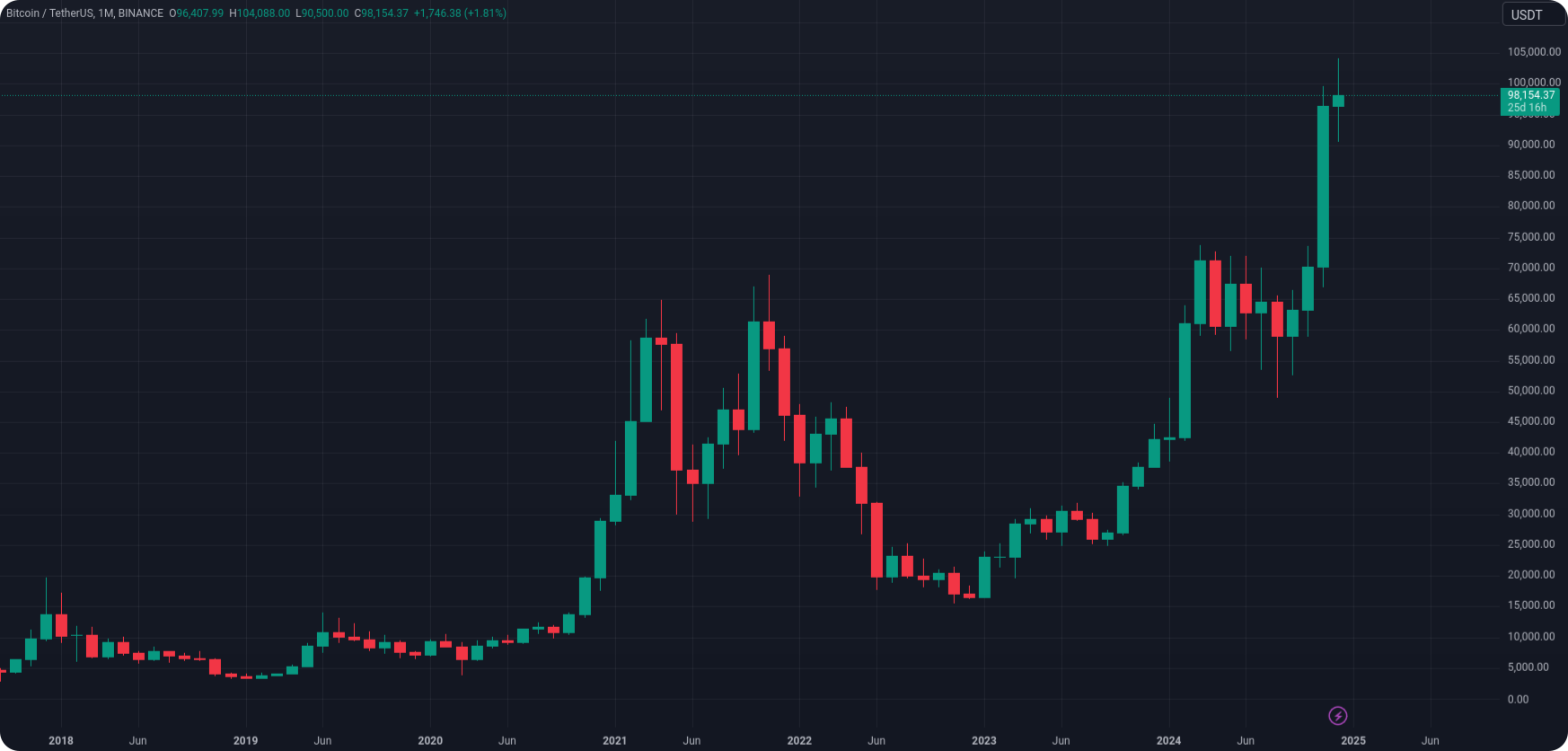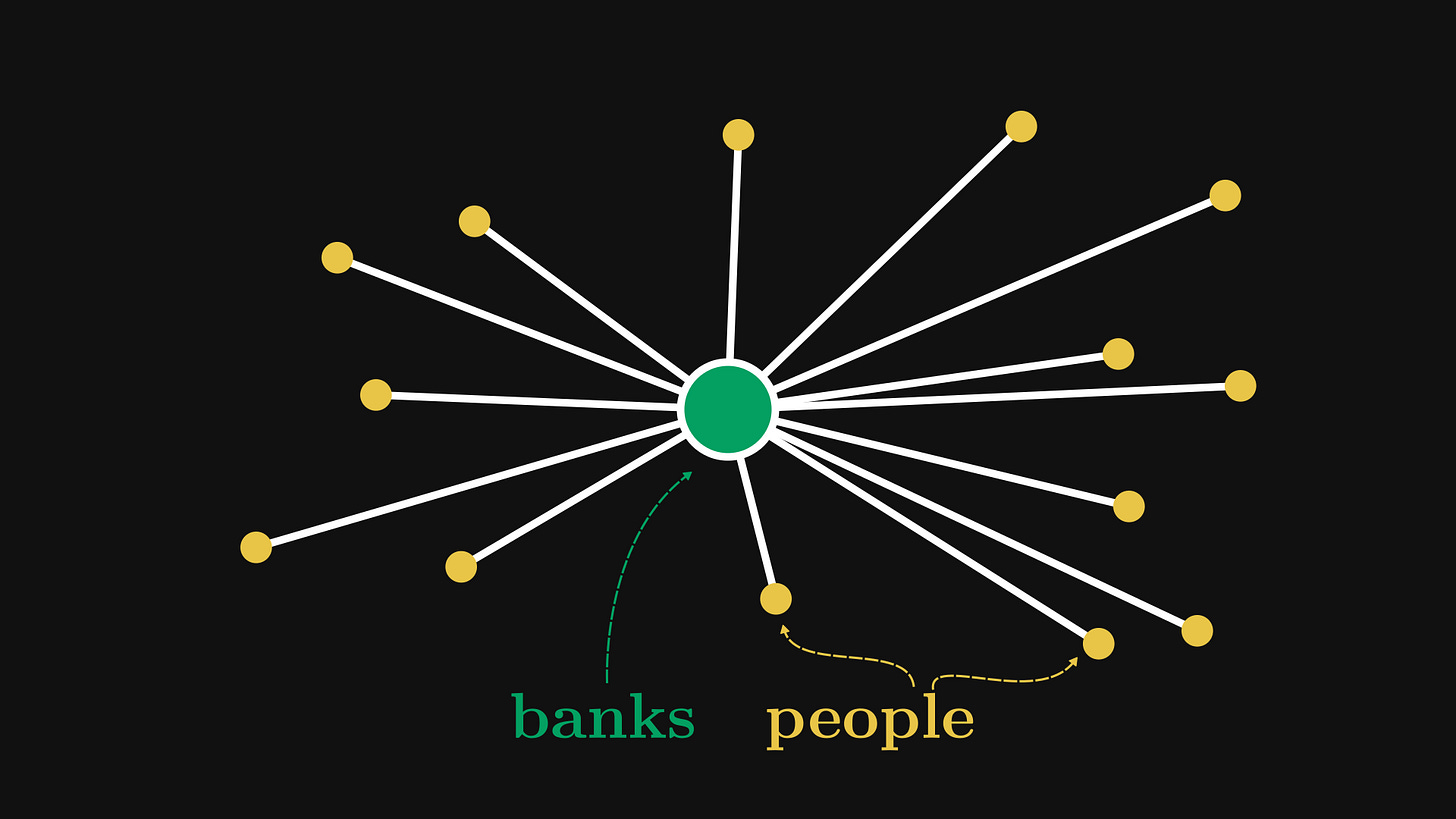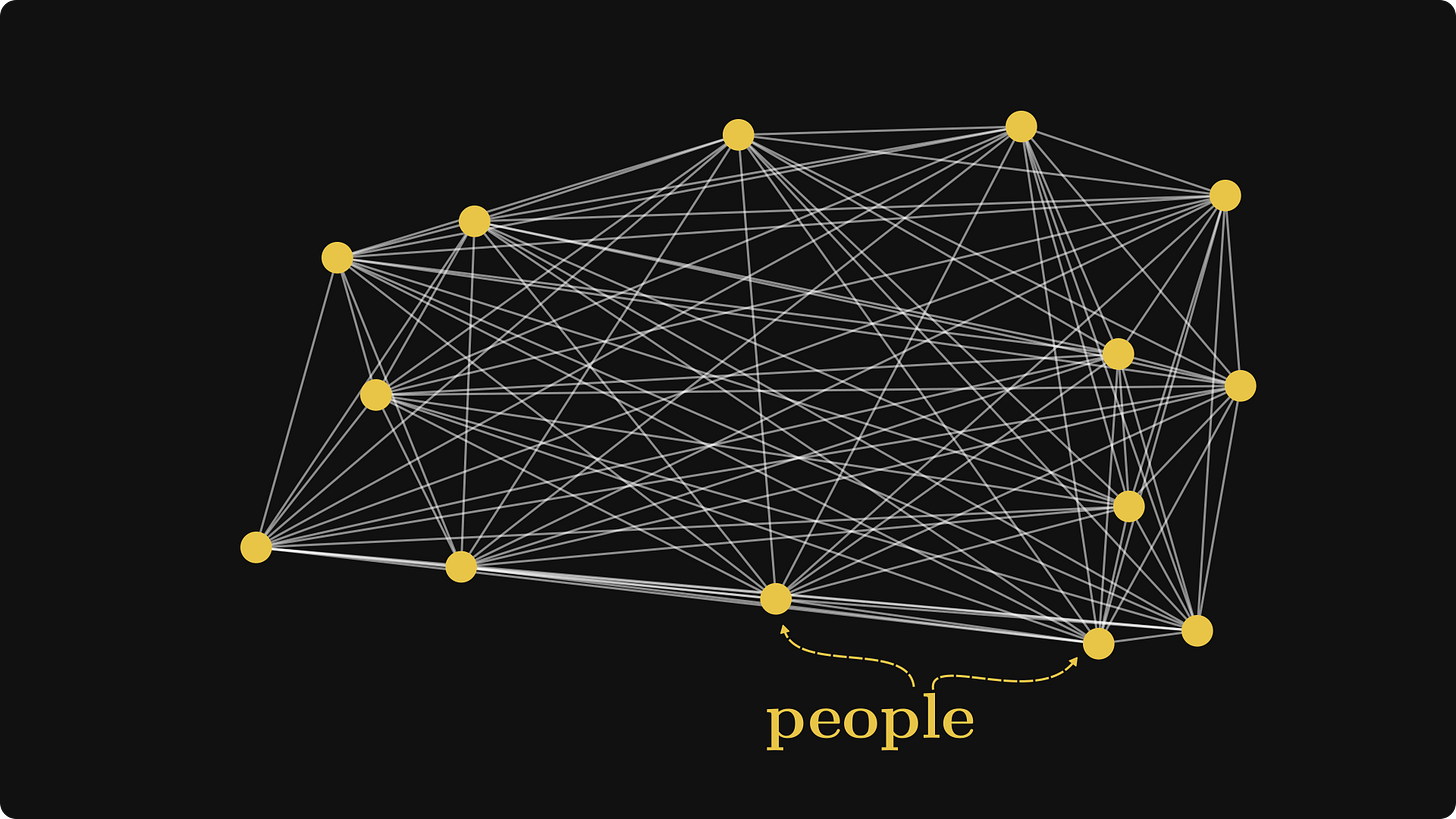Hey!
Here we go again, at the heights of the crypto market. Bitcoin just hit $100000, and everyone talks about crypto once more; even your grandmother has bought some.
Take a look at where we are right now. Tempting, isn’t it?
Any experienced investor knows we’ve been here before: the 2021 peak was an entry point for most. Followed by the enormous crash, they lost their investment. Their cars. Their home.
I told you that the first time is always painful.
A really experienced investor also knows that there’ll be more peaks and there’ll be more crashes. But let’s not get ahead of ourselves!
Despite that even your grandmother is executing margin trades on the market, you (probably) don’t know what a cryptocurrency is. Even though there are a staggering amount of misconceptions and scams out there, we are talking about truly revolutionary technology.
The noise of the cons and the excessive hype drown out the signal.
What are cryptocurrencies? What is their purpose? Will you get rich from them? Should you talk your grandmother down from margin trading?
Let’s get to it.
Disclaimer. This is not financial advice, and I am not qualified to give out such. I’ll mostly talk about the technology behind crypto. Always think critically, educate yourself, and base your financial decisions on sound research.
WTF is a cryptocurrency?
According to the official definition, cryptocurrencies are digital assets, operated on decentralized, blockchain-based networks. They use cryptography to secure transactions, hence the term “crypto”. If you didn’t understand a single word, that’s alright. We are here to talk about all of this.
The definition has three key parts:
decentralized,
blockchain-based,
and digital asset.
I’ll explain everything in due time, but first, let’s talk about money. You know, that number shown by your favorite banking app. It increases when your salary arrives, and decreases when you order a Big Mac menu on Uber Eats.
Have you thought about what this number really is? I’ll disappoint you: your (virtual) money is nothing but a record in one of your bank’s databases. A bunch of ones and zeros. Hell, from this aspect, it’s not that different from the gold in your World of Warcraft account. Still, you can exchange your money for goods and services. This is because we, as a society, decided to trust the government, the banks, and their stability.
How can you spend your money? Well, you can just swipe your card, right? Is it that simple?
Bad news: it’s not that simple.
The money — you know, your money — is ultimately controlled not by you, but by the banks and the state. All you can do is say pretty please, and hope your bank honors the request. Which is, ultimately, decrementing the integer representing your money, and letting the other party’s bank know to increment the number representing theirs. (Or, if the transaction is done within the institution, they’ll do the incrementing themselves.)
Yes, you have read it correctly: your money is not entirely your own, because it is still controlled by the bank and the state. (Everyone whose account has been frozen knows this.) This is a centralized system, governed by the banks in between the people. Who, in turn, are governed by the Big Brother state, overseeing it all.
If you live in the People’s Republic of China, and the social credit system is not your friend, they might even deny you the purchase of a train ticket.
Of course, the world is not black and white. Everyone saying so is lying to you. (Or want to sell you something.) Centralization has several advantages. Say, if your credit card data gets stolen, your bank freezing all outgoing transactions is not such a bad thing. Or, if your bank flops like the Jaguar rebrand, the government might pay out your losses. (In the USA, this is guaranteed up to $250000 by the FDIC insurance.)
There is no such insurance for your crypto assets. (Yet.)
Back to crypto. The biggest innovation of Bitcoin (BTC), the first cryptocurrency, is to create a financial infrastructure without any middlemen like banks. In other words, it is decentralized. Your Bitcoin — and all of your other cryptocurrencies — are yours for real, and no one can take it from you. (If you secure it properly.)
If you want to spend your BTC, you are free to do so at any time.
Imagine agreeing with your friends that from now on, you’ll trade with each other using Shiba Inu portraits printed on toilet paper. (Shiba Inu is a dog breed, and the symbol of the DOGE coin. My choice was not accidental; neither is the toilet paper you print it on.) One sheet is worth a lunch, ten sheets are worth a ride to work, and so on.
What stops you from hijacking the office Xerox and making a wagon of this, practically living free until eternity?
Digital currencies have the same problem. Bitcoin, similarly to the virtual money in your bank account, is a bunch of zeros and ones. Can’t you just create fake transactions, or worse, fake Bitcoins? This is not a problem in our traditional finance system. Banks might control your transactions, but they secure them, too. You just need to trust them. (See, I told you that centralized systems are not the devil.)
This is where the second part the cryptocurrency definition enters the scene: the blockchain, where the bulk of Bitcoin’s innovation lies. Essentially, a blockchain — where Bitcoin transactions are recorded — is a public database, secured via a brilliant use of cryptography.
You read that right: all. Transactions. Are. Public.
See it for yourself: here’s a Bitcoin address containing precisely 42256.48233006 BTCs, worth north of four billion USD when I write this.
Performing a transaction is as simple as making a record in the shared database called the Bitcoin blockchain. In the original construction, the integrity of the database is granted by the so-called validator nodes. If you make an invalid record — say, transfer nonexisting money BTC — it will be rejected. If the transaction is valid, everyone is happy. Especially the validator nodes, which you know as the (in)famous Bitcoin miners.
To sum it up, all transactions are public and secure, and most importantly, you can launch one at any time. Again, one of the biggest advantages of our vanilla financial system is that your balance and transaction history are hidden from your family, your neighbors, colleagues, and sworn enemies.
You can read about the details in the original publication. If you are a technical person, I highly recommend you read this. For now, let’s stay on track and talk about what all the hype is about.
Why is Bitcoin valuable?
Instead of talking about Bitcoin, let's detour into the past once more and talk about gold. Why is gold valuable? Apart from a couple of minor applications — making conductive materials for circuit boards, jewelry for wives and lovers, toilet bowls for oligarchs — let me tell you, gold is of no actual use.
Gold, as a metal, is weak, soft, and too heavy for any sensible construction. Yet, its market capitalization is $17.880 trillion (that is, billion times billion), and all the important people start to sweat really hard when bad guys try to steal the nation's gold reserve in action movies. (Just for comparison, the total capitalization of the European stock market is $12.295 trillion, while the American stock market is $62.748. I found the data here.)
So, why is gold important? Because it is rare, and we humans agree it's worth a lot. (There are other examples from history. For instance, in parts of Africa, salt blocks had the same role.)
The same is true for Bitcoin, which is called the crypto gold for a reason. You can't really pay with BTC yet (and a gold bar would not be accepted at Walmart either), but it's rare, and thus it stores value. Shifting a crypto portfolio towards Bitcoin is the same as turning a vanilla portfolio into gold.
So, Bitcoin is the digital gold. What are the other cryptos?
Good question. Some of them are scams, others are jokes, but trust me, a significant portion of them solve real problems in finance.
Say, there’s Ethereum, which is the second largest crypto according to market capitalization. The Ethereum blockchain is the pioneer of so-called smart contracts. If we can put financial transactions on the blockchain, why can’t we do the same with contracts? Say, how would you like your monthly salary to be automatically and irrevocably transferred to you by your employer instead of relying on their mood? Contractual breaches are a serious problem.
With Bitcoin, we’ve created a secure and decentralized system for finance. With Ethereum, we did the same for contracts. Here’s the twist: Ether (ETH), the native currency of the Ethereum blockchain, is the currency you pay with to execute smart contracts.
So, if BTC is gold, ETH is the petrol running the smart contract infrastructure. Petrol runs the physical world, and ETH (and several others) runs the digital one.
Should you buy crypto or not?
You shouldn’t if you don’t know what you are doing. I mentioned in the beginning that the crypto market is cyclical, and we are marching towards the peak. You don’t need to fear missing out; there’ll be plenty of entry points. The current state is not one. (In my opinion.) At least you can learn the market in the time, giving you a chance to exit as a winner. Instead of losing your house, like many others who bought at the peak.
Is crypto dangerous?
There are two typical concerns: the carbon footprint of mining and the deregulation due to decentralization.
Let’s start with the carbon footprint of the validator servers. Although this is a serious issue with Bitcoin, later projects (like Ethereum) have solved this problem. With Bitcoin, the verification of the transactions is done by solving an algorithmically difficult problem, which makes the processors (CPU and GPU alike) sweat. So, you need energy for real. This is called the proof-of-work consensus mechanism. Opposed to this, ETH and other major projects use proof-of-stake, which replaces heavy computations with a majority vote.
The true problem lies in the deregularization. I’ve heard from many that crypto funds terrorism due to its anonymity. If you have paid attention so far, you know that all transactions on the blockchain are not private but public to the whole wide world. So, money movements are easily traceable and not that anonymous.
Thus, accicentally funding an illegal organization is not a serious threat to you.
What’s serious are the scams praying on human naivety and layman ignorance. Trust me, if the Hawk Tuah girl tells you to buy her new crypto coin, you are already too late to join. All you can get for your money is the priceless experience of having the rug pulled out from under you.
You shouldn’t blame the technology for the scams, but the human nature. Think of all the fraud in the vanilla financial ecosystem. Ponzi schemes. MLM products. (Fake gurus. Yes, I know that it hurts. If you’ve been scammed, learn from it.)
Does the importance of money, as a civilizational milestone, dwindle because your favorite CEO occasionally embezzles a couple of million dollars? No.
We are dumb and easily manipulated by wolves in sheep’s clothing, no matter the setting. Educate yourself and always think critically. (And watch a lot of Coffeezilla, if you want to know how scams work.)
Who am I and what gives me the right to talk about crypto?
Does it matter who I am? Let me tell you a secret: the truth of a statement doesn't depend on its source. You should look at what someone is saying, instead of who is saying it. Even a sworn crypto evangelist can say some unbelievably stupid shit — as they usually do — but on the other hand, even a sixteen-year-old high schooler can have an understanding of the market you can only respect.
It's also irrelevant how much money I've made with crypto. My claims should be validated by facts, not by money. Trust me, there are plenty of people who have the intelligence of a brick, but purchased a handful of Bitcoins around 2010, getting lucky with them. However, you cannot substitute knowledge with money.
Let me tell you a story directly from Robert Cialdini's Influence. (A book that everyone should read.) There was an average American soap opera and an actor named Robert Young playing a doctor. The dude became the face of a coffee producer named Sanka, and even though he had zero medical knowledge, consumers got the illusion that physicians recommended the Sanka decaffeinated coffee. In reality, it was not.
So, if you constantly follow the loudest voices like a sheep, you will end up in a bad place. Not just in crypto.
Why should you believe me, then?
You shouldn't. Critical thinking is one of the most important life skills. Research everything I say, and if I'm talking some stupid shit, call me out. Just make sure to keep it civil. I enjoy being challenged to an intellectual duel. Not to a bar fight.
Alright, but who should you believe?
No one. Well, except yourself. Whenever you consume crypto-related content, you must think real hard about what they're trying to sell you.
I don't mean to disappoint you, but most influencers make their living by getting you to sign up for a crypto exchange through their affiliate link (or, worse, a crypto casino), earning a hefty commission from the money you spend.
It's even worse when someone charges for their analyses or 'trading tips.' Think about it: if a trader is beating the market like Titanic did the Oscars in 1997, do they really need your measly two hundred bucks? They don't, and you know it.
If I ever ask for money for anything in the future, that should make you suspicious, too. Feel free to ask tough questions to anyone, and if you're not absolutely certain about the value being offered, don't take the deal.
Speaking of trust: it's truly an honor that you've read this far. I chose a written format because if you've made it here, it likely means you're interested in the topic, enjoy thinking critically, and maybe I can learn something from you, too. So, I'm looking forward to reading your comments!






